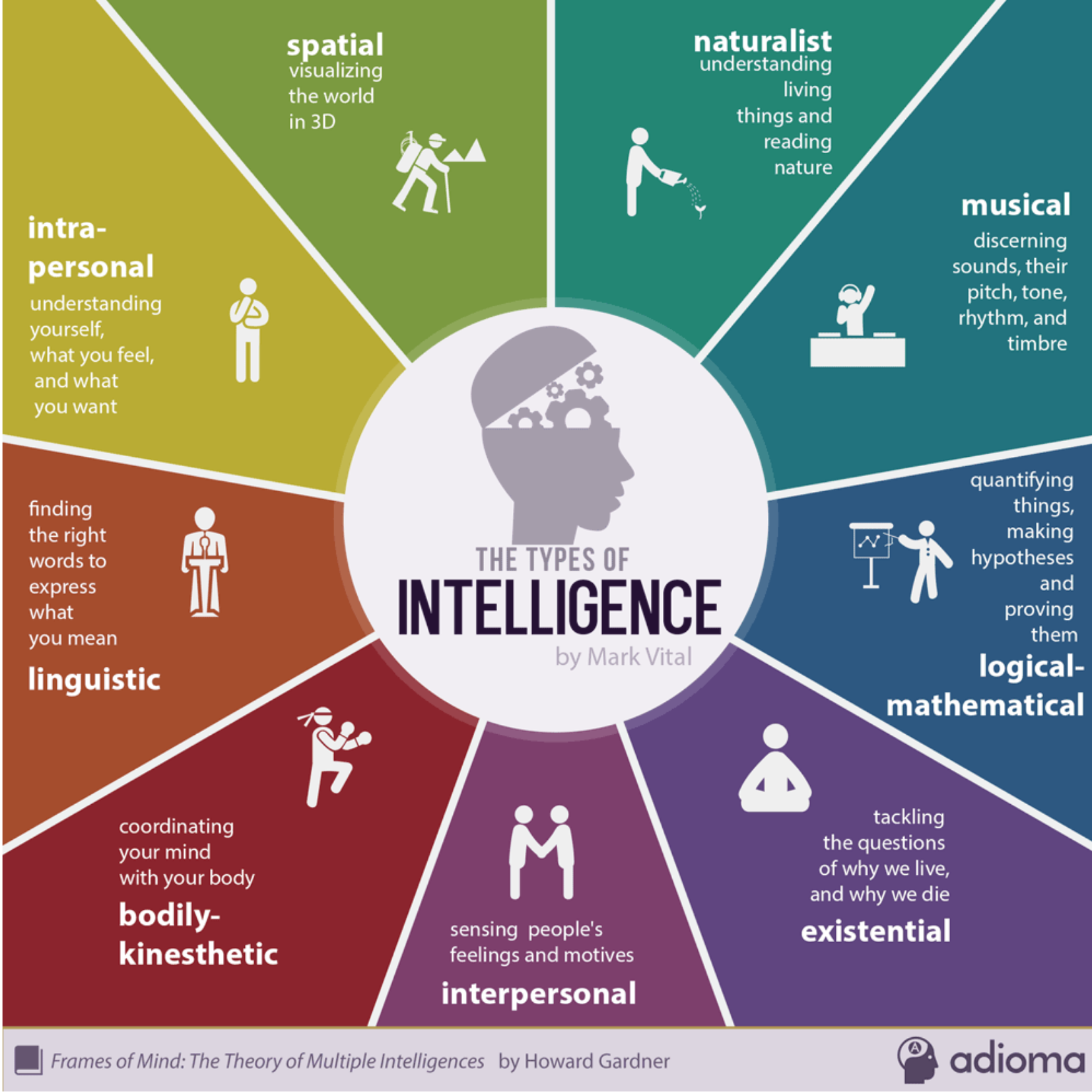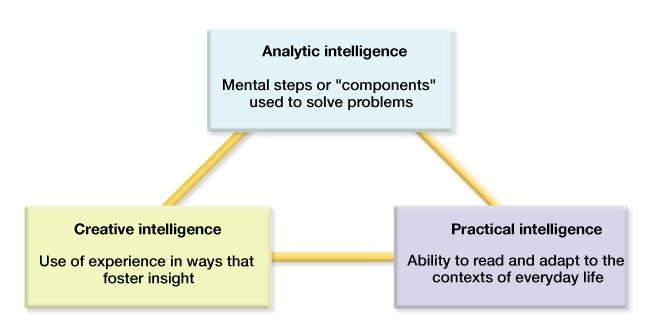Dalia Savy
Sadiyya Holsey
Haseung Jun
AP Psychology 🧠
334 resourcesSee Units
Intelligence
Intelligence can be defined in many ways. It mostly refers to the ability to learn and the capacity for knowledge. There are so many things that make up your intelligence and it really varies based on your environment and culture 💭 🏠 🌍
For example, who is more intelligent to you: someone with street smarts or someone with book smarts?
Also, intelligence varies based on what type of culture exists in your environment (individualistic culture or collectivist culture). Individualistic cultures value being on your own and gathering resources for yourself, while collectivist cultures value group efforts and contributing to the group as a whole.
This shows that there are millions of ways to measure intelligence. You know what this means: lots of different theories.
General Intelligence (g)
Charles Spearman believed we all have 1️⃣ general intelligence, called a "g" factor. G underlies specific mental abilities that can be measured on an intelligence test.
Factor Analysis
Spearman used factor analysis, which is a statistical procedure identifying clusters of items that could measure your intelligence. Spearman found that if you have a high intelligence in one of the subjects, you have an overall high general intelligence 🧠
L.L. Thurstone (7)
Other psychologists, such as Thurstone, thought that intelligence could be broken up into different categories. He split intelligence into seven clusters of mental abilities:
- Word fluency 📝
- Verbal comprehension 👂
- Spatial ability 🗺️
- Perceptual speed 🏃
- Numerical ability 🧮
- Inductive Reasoning 💭
- Memory 🧠
Like Spearman, he believed that someone who succeeds in one category can also find success in the other 6 categories. Therefore, there is still the idea of a g factor lying around.
Howard Gardner (8)
Gardner is did not think there was one factor g determining intelligence. He backed his claim with the Savant syndrome, arguing that individuals who are considered mentally retarded have a specific skill they are exceptional in, typically music, art, or calculations. Therefore, he also views intelligence as multiple abilities.
- Linguistic 🗣️
- Logical-Mathematical 🧾
- Musical 🎵
- Spatial 🌃
- Bodily-Kinesthetic ✋
- Intrapersonal—someone that knows themselves 👤
- Interpersonal—someone that is good with people 🤝
- Naturalist 🌿
Here is a quick visual that really sums his theory up:

Image Courtesy of Adioma.
Daniel Goleman
Daniel Goleman came up with his own idea of emotional intelligence, which has 4 components to it. It's under Gardner because it somewhat goes with interpersonal and intrapersonal intelligence.
Emotional Intelligence is the ability to:
- Perceive emotion—Being able to recognize emotions in faces, voices, and music 🔊
- Understand emotion—How it works and changes 🤷
- Manage emotion—How to have your own emotions and express them 😢😍
- Use emotion—Use emotion to create ideas and express yourself 🤔
Emotional intelligence really goes hand in hand with social intelligence, and being able to be socially aware, have ongoing conversations, and delay gratification. Emotionally intelligent people also have a higher chance of achieving success and getting married (since they could emphasize with others).
Robert Sternberg (3)
Sternberg agreed with Gardner's idea of having multiple intelligences and came up with a triarchic theory:
- 🤔 Analytical Intelligence—Being able to problem-solve and do well in school .
- 🎨 Creative Intelligence—How well you can come up with your own ideas and solutions.
- 💭 Practical Intelligence—Common sense!

Image Courtesy of Fatima Medeiros.
Raymond Cattell (2 G)
Cattell believed something similar to Spearman, with there being a general intelligence, but he split it up into two different types of general intelligences:
Fluid Intelligence
Fluid intelligence is the ability to solve problems logically and think in abstract ways. This also comes with thinking quickly and processing a lot of information at once.
Crystallized Intelligence
Crystallized intelligence is the sum of knowledge, facts, and skills an individual has acquired over their lifetime. Unlike fluid intelligence, with crystallized intelligence, you may use a lot of heuristics.
With age, we gain crystallized intelligence and lose fluid intelligence.
Table
Here is a summary of all of these theories:
| Theory | Summary | Strengths | Other Considerations |
| Spearman's general intelligence | A basic intelligence predicts our abilities in varied academic areas. | Different abilities, such as verbal and spatial, do have some tendency to correlate. | Human abilities are too diverse to be encapsulated by a single general factor. |
| Thurstone's primary mental abilities | Our intelligence may be broken down into seven factors. | A single g score is not as informative as scores for seven primary mental abilities. | Even Thurstone's seven mental abilities show a tendency to cluster, suggesting an underlying g factor. |
| Gardner's multiple intelligences | Our abilities are best classified into eight independent intelligences. | Intelligence is more than just verbal and mathematical skills. Other abilities are equally important to our human adaptability. | Should all of our abilities be considered intelligences? Shouldn't some be called less vital talents? |
| Sternberg's triarchic theory | Our intelligence is best classified into three areas that predict real-world success. | These three facets can be reliably measured. | 1. These there facets may be less independent than Sternberg thought and may share underlying g factor. 2. Additional testing is needed to determine whether these facets can reliably predict success. |
Table Courtesy of. Mr. Lipsky
Intelligence, in addition to the above mentioned theories, has an aspect called speed of processing, which is essentially just how fast we can process things. There's also the stereotype threat, which is Claude Steele's concept that some people feel more anxious in achieving high intelligent performance when part of a group that has a negative stereotype.
Flynn effect
The Flynn effect is the trend that there is an increase in intelligence testing scores over time. The average intelligence score in the 1940s is lower than the average intelligence score in 2019.

Image Courtesy of Our World in Data.
Browse Study Guides By Unit
🔎Unit 1 – Scientific Foundations of Psychology
🧠Unit 2 – Biological Basis of Behavior
👀Unit 3 – Sensation & Perception
📚Unit 4 – Learning
🤔Unit 5 – Cognitive Psychology
👶🏽Unit 6 – Developmental Psychology
🤪Unit 7 – Motivation, Emotion, & Personality
🛋Unit 8 – Clinical Psychology
👫Unit 9 – Social Psychology
🗓️Previous Exam Prep
📚Study Tools
🤔Exam Skills

Fiveable
Resources
© 2025 Fiveable Inc. All rights reserved.